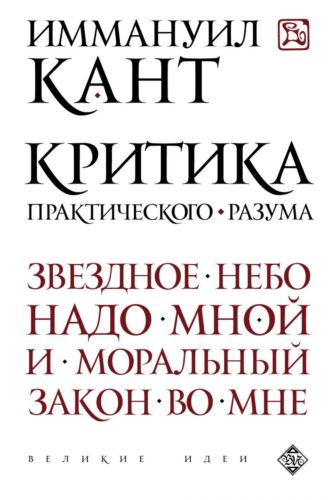Описание книги
About the product About the series: The Great Ideas series is a library of outstanding examples of human thought. This is a selection of famous works of thinkers of all times and peoples. These are the main works of philosophers since ancient times: from Confucius and Plato to Freud and Nietzsche. We especially carefully select works that are simply necessary to have in your library for both students and all educated and erudite people. Convenient pocket format, paperback will allow you to get acquainted with literary works on the way to college or work. For ease of use, our editors have highlighted Selected Quotes in each book, which will allow you to quickly recall the key thoughts of the authors, if necessary. About the book: This book includes the main work of Kant’s ethical theory — «Critique of Practical Reason.» According to the philosopher, a person can be truly happy only if he realizes that he is worthy of happiness. And this can be achieved only by fulfilling a duty, that is, by following the moral law. This work is dedicated to the nature of moral law, ethics of duty. For whom: — for those who are interested in philosophy — for those who appreciate convenient formats In the series: Niccolo Machiavelli «The Emperor» Friedrich Nietzsche «So Zarathustra said» Emmanuel Kant «Criticism of practical reason «Plato» Apology of Socrates. Crito. Protagoras «Alexander Suvorov» Science to win «Arthur Schopenhauer» The world as will and representation «Confucius» Judgments and conversations «Sigmund Freud» Psychopathology of everyday life «Leo Tolstoy» What is my faith «Aristotle» Politics » Sun Tzu «The Art of War» Abstract «Critique of Practical Reason» is the main ethical treatise of Immanuel Kant, developing the ideas of his «Critique of Pure Reason» and exploring in detail the concept of the categorical imperative — the highest principle of morality. Three starting points of Kant’s theory: «must means you can «,» the immortality of the human soul must exist «and» God must exist «. Man has free independent will, while he consciously follows virtue. The reward awaits him outside this world, and God acts as its guarantor. Thus, Kant equated religion and morality, since their content and goals coincide. One of the leading translators of Kant into Russian was the poet, literary critic and critic Nikolai Matveyevich Sokolov (1860-1908). He became interested in the teachings of Immanuel Kant, while still a student at the theological academy, and at the same time began to translate the first major work of the philosopher — «Critique of Pure Reason.» Having translated the main treatises of Kant, he later presented his other works to Russian readers. Sokolov’s translations are considered accurate and complete, they were reprinted several times in Soviet times. Like other books in the Great Ideas series, the book will be simply irreplaceable in the library of humanitarian students, as well as for those wishing to get acquainted with key works and ideas of world philosophy and culture. …
FAQ
